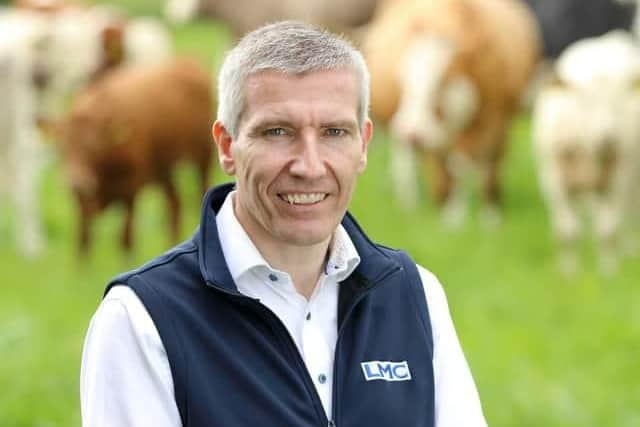Beef trade set to remain steady
and live on Freeview channel 276
The organisation’s chief executive, Ian Stevenson, commented: “We are seeing cattle prices at record levels right now. Yes, there was a bit of a dip in the total volume of beef retail sales in GB in the 12 weeks ending 22 January 2023.
“But this is a trend that we would normally expect to see developing in the weeks directly after Christmas.
Advertisement
Advertisement
“However, demand for cheaper cuts of beef such as mince has, actually, increased since the start of the year.”


Stevenson confirmed that the throughput of cull cows at the plants has remained strong over the past number of weeks.
“Milk prices have now started to weaken. I’m not sure if this will lead to more cows coming through the system, given the trends that we are already seeing,” he added.
Like all other commodities, beef prices are impacted by supply: demand factors.
Advertisement
Advertisement
The LMC representative pointed to the re-opening of China, in the wake of the Covid crisis, as being a major driver within the international red meat market at the present time.
“China is a major player on all global meat markets,” he added.
“Last year saw 30% of all beef and veal traded on world markets imported to that country.
"The beef industries of North and South America continue to export significant quantities of beef to China, although imports from Brazil have been temporarily suspended after a case of BSE was detected there recently.
Advertisement
Advertisement
“The UK is not exporting beef directly to China at the present time. However, a lot of the technical work required to make this happen has already been completed.
“The Department of Environment, Food and Rural Affairs takes the lead on all technical matters relating to this international trade,” said Ian Stevenson.
“Prior to Covid, the vast bulk of the work required to meet the veterinary and other procedural requirements set out by the Chinese authorities had been successfully addressed.
Turn to page 14
“The situation was unfortunately complicated in 2021 following the confirmation of a classical BSE case in Somerset England.
Advertisement
Advertisement
“Hopefully, these market access issues can be ramped up again in the near future, now that China’s Covid restrictions have been removed and the detailed epidemiology report of the Somerset BSE case detected no evidence of cause for concern.
“The Chinese market is a valuable outlet for all cuts of beef. From a processing point of view, this helps deliver much needed carcase balance.”
Turning to the home market, Ian Stevenson confirmed that the LMC’s latest beef advertising campaign is now up and running.
It represents the latest instalment of a storyline themed: Good Honest Food - The Truth About Beef.
Advertisement
Advertisement
Once again, the LMC’s chef ambassador, James Devine, is featured on his continuing journey to find out what makes Northern Ireland Farm Quality Assured beef so special.
The campaign reflects the health benefits relating to beef consumption while also focussing on the exemplary animal welfare and environmental standards that are consistently achieved by local livestock farmers.
Along the way, James meets-up with Dr Steven Morrison, head of sustainable livestock production at the Agrifood and Biosciences Institute (AFBI), and Dr Ruth Price - clinical trials manager in the School of Biomedical Sciences at Ulster University.
The new campaign will feature across a wide range of media outlets until the end of March.
Advertisement
Advertisement
Turning to the prospects for lamb, Ian Stevenson said that 2022 had been a challenging year for the sector.
“UK retail prices had increased by some 10%. However, sales’ volumes had fallen by 18%,” he commented.
“Lamb is a very price sensitive product when it comes to consumer purchasing. It is also a meat that is very much more consumed on special occasions, Easter being one of these.
“Lamb sales also jumped considerably in the run-up to last Christmas with roasts and shoulder joints very much in demand.
Advertisement
Advertisement
“Driving all of this was a desire on the part of many consumers to try an alternative to turkey. The Bird Flu crisis of the time also added to consumer concerns about the availability of a poultry option for Christmas.”
Looking ahead, the LMC representative pointed to the importance of Muslim religious festivals, including Ramadan, to drive sales of local lamb. Approximately 6% of the European Union’s total population now practise the Muslim faith
Ian Stevenson concluded: “But our main priority is to let consumers know that lamb is a meat for every day in the week.”